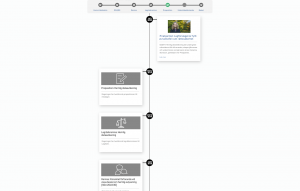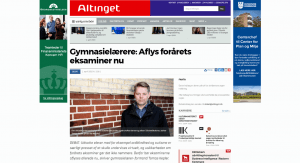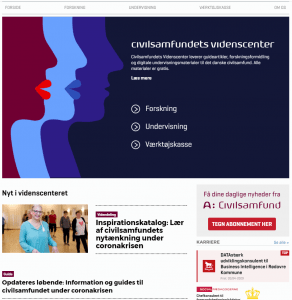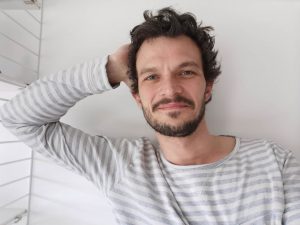Altinget: robot, engagement and constructive political journalism innovation
Kristoffer Hecquet is head of the rather modestly named ‘projects department’ at Altinget – and with only two full-time staff, on the face of it, it might appear a rather modest operation.
Behind the scenes though, Hecquet has spent 10 years fundraising for this ‘media lab’ to exist within Denmark’s digital-first, politics-first Altinget – the Danish equivalent of Politico.
“I fundraised my own position. That’s how it developed,” he says, explaining that he joined the business a decade ago as an intern. Now he heads a small team with a portfolio of different editorial innovation projects. “It’s 100 per cent financed by external funding.
“Its raison d’être is to develop digital editorial projects that support the existing business and it also works to develop new editorial products that have economic potential.”
Editorial staff at Altinget work along political verticals – which are chosen to be closely aligned to government departments – whether that’s education or agriculture. From here, they contribute to a common frontpage that’s financed by advertising and has more than 100,000 Danish subscribers.
The in-depth reporting within each vertical is then paid for by subscribers, representing up to 80 per cent of revenues, from political professionals, politicians and other interest groups. “All organisations or persons who need influence in this specific policy area”, Hecquet explains.
Finding a niche
The most regular innovation work his team does is leading the development of ‘Voter Advice Applications’ (VAAs) that help people make decisions about who to vote for.
Here, Altinget has a big focus on collaboration and that means working with some of the Nordics’ biggest media players, including the public-service broadcasters in Denmark and Sweden, DR and STV, as well as the Norwegian press agency NTB. As innovation projects go, these have long lead times and are easily mapped as they align to regular political cycles.
“SVT and DR are pretty powerful because people trust them, they are everywhere and they’re free. We are strictly neutral, otherwise we wouldn’t be able to serve our readers with the purpose that we have. That’s a good base for us to build a VAA because we don’t have any bias. If we would have, we wouldn’t have a business.
“The most important thing here is to be very careful. We have a big dialogue with our customers on how to make sure the VAAs are politically neutral. We have a strict system of testing – including our journalists on each vertical – so we have a big battery of competence.
“Then we also have scientists that look through statements and we test on users as well. We make tests and simulations – both before and after – and that’s pretty important work.
After already expanding its business into Sweden, it’s these VAAs that present an opportunity for Altinget to expand into other countries, Hecquet says.
“It’s also a huge dataset on all the candidates – what they think about the political stances – so it’s very good for data journalism.”
When he’s not helping negotiate the next long-term deal for a VAA, he’s working up other editorial innovation projects that could ultimately support the bottom-line. Hecquet has won funding from Google DNI, and various national and European political bodies, to continue this work.
“It’s based on dialogue with the editorial team – sometimes it’s me pushing the idea, sometimes it’s the other way around. Quite a heavy focus now is to support our existing journalism with data, discovering data, covering statistics on political parties and polls, but also producing semi-auto-generated content. When we’re working on robot journalism it’s very short term – it all depends on what’s also on the table.
“We also work a lot with structured journalism – one big project here is called the ‘decision chain’, which we have worked out in both Sweden and Denmark with support from DNI.
Opening up government data
“It’s based on public open data from the government and parliaments in Denmark and Sweden. From it, we make this ‘legislative chain’ to create auto-generated, mini-articles from all the legislative steps in the parliament.
“They spend a lot of money to make their open data available, so they’re so happy when finally someone uses it.”
The result is a visual timeline that updates when a given piece of legislation takes another step through the relevant process, complemented by longer pieces written by Altinget journalists.

“Of course, we now automate some processes that we did manually before, which is very good, but we also put an extra dimension to our journalism. When you read an article – even though you’ve read the full article – it’s not the end product. It’s part of a bigger whole.
“The latest thing in the Swedish version is – when logging in, you can subscribe to one of these strings – so every time there is a new article or a new element from the data, you get a notification. So you’re always alert on the specific law proposal that you follow.
“In Sweden it has particular value because there’s no other place where you bind together data from the government and the parliament.”
Altinget worked with data journalism experts Journalism++ during the development phase of this product, “for their competence on open data”, but further developments are done in house.
Getting dialogue with readers
Hecquet also won Google DNI funding for pursuing more ‘engaged journalism’ among journalists and readers – which will see them building a new digital platform.
“A few years ago we introduced very organised debate entries in the verticals – and it’s now more or less getting half of the traffic – because it really turned into creating the political community around these sectors. This is just as important as the journalism.
“When we have a debate, on how to treat groundwater in the farming sector for example, we take experts, the government, the opposition, the farmers themselves, the environmental organisations – the whole spectre of interest groups. We create the platform for them to have an orderly discussion.

“Before, we spent a lot of time persuading them to participate, but now they more or less come themselves to be a part of the discussion. They have to be at Altinget to stay informed because all the others do it.
“It’s hard to find this kind of dialogue anywhere else unless you meet the person live in the parliament building. They do it because they need to – if they need political influence, then they have to read our newspaper.
Altinget has also taken a step into constructive journalism, which is resulting in the creation of a civil society ‘knowledge center’. Hecquet got the initial work to start serving this audience privately funded for three years, despite it not being a standard Altinget vertical.
“It’s a homepage where we gather information about what civil society does – we have a database on the science of civil society – but the most important thing is our toolbox. It’s a weekly newsletter with constructive journalism articles on things like ‘how to run your organisation when you have coronavirus’. It’s not news, but a newsletter with tools.
“We also use the ‘knowledge center’ to try out things, test some new designs, or ideas such as ‘how we can do online education?’, things we haven’t tried in other parts of the organisation, but we can try it there because we have funding.”

Just launching in 2020 is a political education resource for teachers to share Altinget content with pupils. This is the result of a three-year funded project – youth media on politics and society focused on getting 13 to 18-year-olds more engaged.
One of the next things to tick off his to-do list is a rebrand, Hecquet explains, taking on the all-important ‘media lab’ nametag to make sure people across the organisation know what project work is being done – and why.
Internal negotiation
Altinget launched in 2000 and has grown from covering six verticals allied to Danish political departments to reporting on more than 20 across two nations. Since Hecquet started, the staff has grown from around 20 to 150 and Altinget also bought the older Scandinavian political title Monday Morning, integrating IT, sales and more for greater efficiency.
“We’re in the process of rebranding as we’ve had shifting leadership and the organisation has grown a lot. Media lab would probably be the best term from what we do – but if that’s accepted in the rest of the organisation is unsure. That’s how we’re beginning to rebrand ourselves internally and, when we have to explain what we do, that’s most often the term that comes up.”
But he’s also keen to get a developer into his team long-term.
“We are pretty agile and staffing depends a lot on the project. The reason why it’s possible for me to get things done is that I have a budget. I can prioritise the IT team to make a certain thing in a certain amount of time and they will prioritise this because I have a budget.
“But we’re often delayed because of a bottleneck – developers are always in demand. I think that it will help a lot in digital development, to work more closely with developers, to have more space to experiment.”
CONTACT

Kristoffer Hecquet, head of projects
Twitter: @hecquetk
